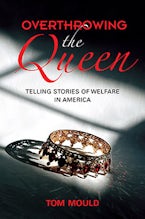- Home
- Overthrowing the Queen
Preparing your PDF for download...
There was a problem with your download, please contact the server administrator.
Overthrowing the Queen
Telling Stories of Welfare in America
by Tom Mould
Published by: Indiana University Press
384 Pages, 22 color, 18 graph., 5 tab.
- eBook
- 9780253048059
- Published: August 2020
$18.99
- eBook
- 9780253048066
- Published: August 2020
$18.99
Other Retailers:
In 1976, Ronald Reagan hit the campaign trail with an extraordinary account of a woman committing massive welfare fraud. The story caught fire and a devastating symbol of the misuse government programs was born: the Welfare Queen. Overthrowing the Queen examines these legends of fraud and abuse while bringing to light personal stories of hardship and hope told by cashiers, bus drivers, and business owners; politicians and aid providers; and, most important, aid recipients themselves. Together these stories reveal how the seemingly innocent act of storytelling can create not only powerful stereotypes that shape public policy, but also redemptive counter-narratives that offer hope of a more accurate, fair, and empathetic view of poverty in America today. Overthrowing the Queen tackles perceptions of welfare recipients while proposing new approaches to the study of oral narrative that extend far beyond the study of welfare, poverty, and social justice.
Acknowledgments
Section I: Welfare Legends: An American Tradition
Chapter 1: Introduction
Chapter 2: The Welfare System and Narrative Scholarship
Chapter 3: Birth in a Nation
Section II: Insider Views: Aid Recipients' Stories
Chapter 4: Origin Stories
Chapter 5: Challenge Stories
Chapter 6: Making Ends Meet and Achieving Success Stories
Section III: Public Debates: Clash of Cultures
Chapter 7: Symbols and Stereotypes
Chapter 8: Hard Workers and the Worthy Poor
Chapter 9: Welfare Lore in Social Media
Section IV: Re-Envisioning Legends
Chapter 10: Context as Creator of Tradition
Chapter 11: Truth and Doubt in Contemporary Tradition
Chapter 12: Overthrowing the Queen
Epilogue
Appendix
Notes
Sources Cited
Tom Mould is Professor of Anthropology and Folklore at Butler University. He is the author of Still, the Small Voice: Narrative, Personal Revelation, and the Mormon Folk Tradition, Choctaw Prophecy: A Legacy of the Future, and Choctaw Tales.
"
Tom Mould's Overthrowing the Queen: Telling Stories of Welfare in America is a remarkable work, destined to be a folklore classic. Moving confidently among politics, history, and sociology, never losing sight of the power of narrative and the influence of tradition, Mould demonstrates the complex origins and effects of accounts of governmental support. Fair-minded and balanced, Mould recognizes that no one side holds the truth, but that recipients, providers, and citizens connect personal stories, legends, rumors, and ideology into a set of justice claims. The question of who deserves what is not simply a matter of ideology, but of belief in stories.
" ~—Gary Alan Fine, co-author of Whispers on the Color Line: Rumor and Race in America
"
Is there common sense in a polarized America? Yes and no. This magisterial study uncovers the processes by which stereotyping narratives cross social divides and override facts, shaping public understandings of poverty that stigmatize recipients of government aid programs. Connecting the dots among "welfare queen" legends, recipient experiences, policy contradictions, campaign rhetoric, online debate, and neighborly conversations, Tom Mould shows how the postwar welfare state became an object of generalized suspicion and how the American Dream was narrowed into an ideal of solitary achievement that ultimately none of us can attain. His assessment of strategies for fighting false beliefs is both constructive and sobering.
" ~—Dorothy Noyes, author of Humble Theory: Folklore's Grasp on Social Life
"
" ~—Diane Goldstein, author of Once Upon a Virus: Aids Legends and Vernacular Risk PerceptionOverthrowing the Queen
is smart and captivating, beautifully researched, well argued, superbly documented, and well written. The volume contrasts legend, personal experience narrative, social media, politics, statistics, propaganda, and policy related to issues of welfare use, teasing apart the articulated experiences, interpretations, fears, and goals of both those who suspect abuse of the welfare system and those who have lived or worked within it. This book will appeal not only to folklorists, anthropologists, and sociologists, but also to political scientists, economists, social workers, and policy wonks, shaping the conversation for decades to come.
"Mould brilliantly captures the importance of prejudices towards welfare and how these social misrepresentations can shape current policies on public assistance."
~Eric Gagnon Poulin, Ethic and Racial Studies
"The title calls forth something promising, and the author does not disappoint.Any course on storytelling, oral history, or in disciplines such as Black studies or sociology should assign sections from this book."
~Wade G. Addison - National University, Journal of American Folklore
- Chicago Folklore Prize
- Brian McConnell Award
Tom Mould discusses Overthrowing the Queen on the New Book Networks "New Books in Folklore" Podcast - https://newbooksnetwork.com/overthrowing-the-queen
Overthrowing the Queen by Tom Mould
Overthrowing the Queen by Tom Mould tackles perceptions of welfare recipients while proposing new approaches to the study of oral narrative that extends far beyond the study of welfare, poverty, and social justice.


